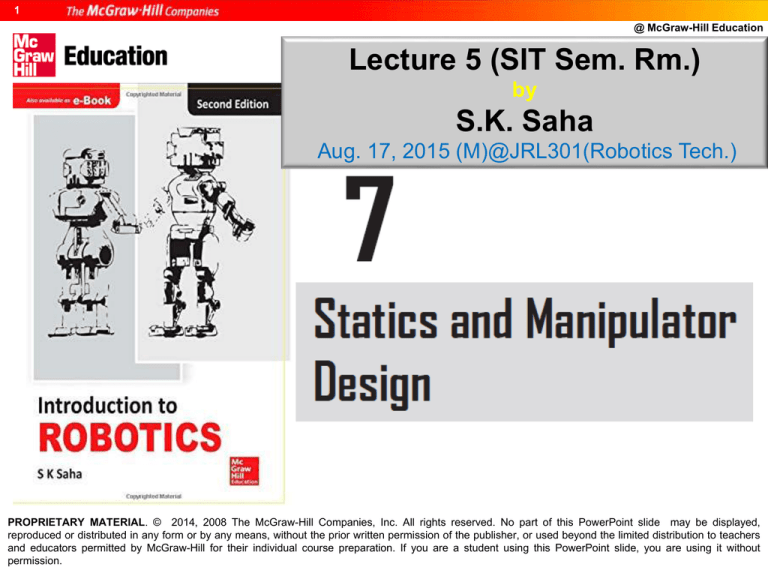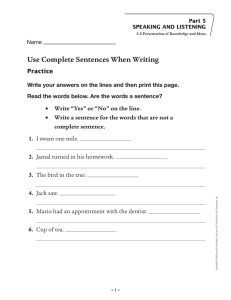
1
@ McGraw-Hill Education
Lecture 5 (SIT Sem. Rm.)
by
S.K. Saha
Aug. 17, 2015 (M)@JRL301(Robotics Tech.)
PROPRIETARY MATERIAL. © 2014, 2008 The McGraw-Hill Companies, Inc. All rights reserved. No part of this PowerPoint slide may be displayed,
reproduced or distributed in any form or by any means, without the prior written permission of the publisher, or used beyond the limited distribution to teachers
and educators permitted by McGraw-Hill for their individual course preparation. If you are a student using this PowerPoint slide, you are using it without
permission.
2
@ McGraw-Hill Education
Principle of Virtual Work
T
w e x
τ θ
T
… (7.28)
• Relation between two virtual displacements
(Can be derived from velocity expression)
x Jθ
T
w e Jθ
… (7.29)
w J τ … (7.31)
T
e
τ θ
T
τ J we
T
T
… (7.32)
3
@ McGraw-Hill Education
Example: 2-link RR Planar Arm
From FBD
τ1 [e ] [n01 ]1
T
1 1
a1 f x sθ2 (a2 a1cθ2 )f y
τ 2 [e ] [n12 ]2 a2 f y
T
2 2
τJ f
T
τ1 T a1sθ 2 a1cθ2 a2
τ J
0
a
τ
2
2
fx
0
f
f
y
0
0
4
@ McGraw-Hill Education
Two Jacobian Matrices
• From
Statics
a1 sθ 2
J a1cθ 2 a2
0
0
a2
0
• From
a1 s1 a 2 s12
Kinematics J
a1 c1 a 2 c12
a 2 s12
a 2 c12
5
@ McGraw-Hill Education
Jacobian from Statics in Frame 1
0
c1 s1 0 c 2 s 2 0 a1sθ 2
[J ]1 s1 c1 0 s 2 c 2 0 a1cθ2 a2 a2
0
0
1 0
0
1
0
0
a1sθ1 a2 sθ12 a2 sθ12
a1cθ1 a2 cθ12
a2 cθ12
0
0
… (7.34)
• Without the last row, it is the same as
the one from kinematics Should be!
6
@ McGraw-Hill Education
Manipulator Design
• High investment in robot usage low
technological level of mechanical structure
• Functional Requirements
• Kinetostatic Measures
• Structural Design and Dynamics
• Economics
7
@ McGraw-Hill Education
Functional Requirements of a
Robot
• Payload
• Mobility
• Configuration
• Speed, Accuracy and Repeatability
• Actuators and Sensors
8
@ McGraw-Hill Education
bmin b bmax, for 0o 360o
9
@ McGraw-Hill Education
Dexterity and Manipulability
• Dexterity wd det(J )
• Manipulability wm
… (7.44)
T
det(JJ )
• Non-redundant manipulator square
Jacobian
wm det(J)
wd wm
10
@ McGraw-Hill Education
Motor Selection (Thumb Rule)
• Rapid movement with high torques (>
3.5 kW): Hydraulic actuator
• < 1.5 kW (no fire hazard): Electric
motors
• 1-5 kW: Availability or cost will
determine the choice
11
Simple Calculation
@ McGraw-Hill Education
2 m robot arm to lift 25 kg mass at 10
rpm
• Force = 25 x 9.81 = 245.25 N
• Torque = 245.25 x 2 = 490.5 Nm
• Speed = 2 x 10/60 = 1.047 rad/sec
• Power = Torque x Speed = 0.513 kW
• Simple but sufficient for approximation
12
Practical Application
@ McGraw-Hill Education
Trapezoidal
Trajectory
Subscript l for load; m for motor;
G = l/m (< 1); : Motor + Gear box efficiency
13
@ McGraw-Hill Education
Accelerations & Torques
Ang. accn. during t1:
Ang. accn. during t2: Zero (Const. Vel.)
Ang. accn. during t3:
Torque during t1: T1 =
Torque during t2: T2 =
Torque during t3: T3 =
14
RMS Value
@ McGraw-Hill Education
15
@ McGraw-Hill Education
Motor Performance
16
@ McGraw-Hill Education
Final Selection
• Peak speed and peak torque
requirements , where TPeak is max of
(magnitudes) T1, T2, and T3
• Use individual torque and RMS values
+ Performance curves provided by the
manufacturer.
• Check heat generation + natural
frequency of the drive.
17
@ McGraw-Hill Education
Dynamics and Control
Measures
• Rule of Thumb
1
n r
2
… (7.51)
n
: closed-loop natural frequency
r
: lowest structural resonant frequency
18
@ McGraw-Hill Education
Manipulator Stiffness
1
1
1
2
ke k1 k2
… (7.48)
ke equivalent stiffness
gear ratio
19
@ McGraw-Hill Education
Link Material Selection
• Mild (low carbon) steel:
Sy = 350 Mpa; Su = 420 Mpa
• High alloyed steel
Sy = 1750-1900 Mpa; Su = 2000-2300
Mpa
• Aluminum
• Sy = 150-500 Mpa; Su = 165-580 Mpa
20
@ McGraw-Hill Education
Driver Selection
• Driver of a DC motor: A hardware unit
which generates the necessary current
to energize the windings of the motor
• Commercial motors come with
matching drive systems
21
@ McGraw-Hill Education
Summary
• Statics in robotics
• Manipulator design
22
@ McGraw-Hill Education
Lecture 6 (SIT Sem. Rm.)
by
S.K. Saha
Aug. 24, 2015 (M)@JRL301(Robotics Tech.)
PROPRIETARY MATERIAL. © 2014, 2008 The McGraw-Hill Companies, Inc. All rights reserved. No part of this PowerPoint slide may be displayed,
reproduced or distributed in any form or by any means, without the prior written permission of the publisher, or used beyond the limited distribution to teachers
and educators permitted by McGraw-Hill for their individual course preparation. If you are a student using this PowerPoint slide, you are using it without
permission.
23
@ McGraw-Hill Education
Outline
• Definition
• Euler-Lagrange Formulation
– Generalized coordinates
– Kinetic and potential energy
– Equations of Motion
24
@ McGraw-Hill Education
Euler-Lagrange Formulation
d L L
i
dt q q
i
i
L (Lagrangian) = T – U;
T: Kinetic energy; U: Potential energy;
qi: Generalized coordinate;
i : Generalized force.
25
@ McGraw-Hill Education
Generalized Coordinates
• Coordinates that specify the configuration (position and
orientation) generalized coordinates
26
@ McGraw-Hill Education
Kinetic and Potential Energies
• Kinetic Energy
n
n 1
T T m cT c ωT I ω
i
i i i
i i i
2
i 1
i 1
• Potential Energy
n
T
U m c g
i i
i 1
27
@ McGraw-Hill Education
Euler-Lagrange Equation
External
force, f e
j
f
Mass,
m
c
Reaction, f c
i
Kinetic energy
1
T mcT c; U 0
2
1
2
L(=
T
-U)
mx
c
x
i
;
Velocity constraint:
2
L
d L
L
mx;
(
) mx;
0
x
dt x
x
Euler-Lagrange:
mx f
28
@ McGraw-Hill Education
Example: One-DOF Arm (EL)
2
1 a Please
1
ma
T m( ) 2
2;
2 2 write!
2 12
a a
U mg ( c )
2 2
ma2 2
a
L T -U
mg (1 c )
6
2
d L
1
1
2 L
( ) ma ;
mgas
dt
3
2
1 2 1
ma mgas
3
2
29
@ McGraw-Hill Education
Simulation of One-link Arm using MATLAB and MuPAD
(contd…)
RoboAnalyzer
30
@ McGraw-Hill Education
Simulation of One-link Arm using
MATLAB
2
1
( mga sin )
2
ma
2
Hence, the state-space form is given by
y1 y2
2
1
y2
( mga sin )
2
ma
2
31
@ McGraw-Hill Education
Mobile Robots
• Non-holonomic systems
– Necessary and sufficient no. of variables
defining a pose exceeds the number of
actuators
• Holonomic
– Necessary and sufficient no. of variables
defining a pose is same as the no.
independent actuators
32
@ McGraw-Hill Education
Summary
• Euler-Lagrange equation was shown
– Generalized coordinates, generalized
forces were defined
• Demonstration with MATLAB and
RoboAnalyzer
• Mobile Robot Dynamics
33
@ McGraw-Hill Education
Lecture 7 (SIT Sem. Rm.)
by
S.K. Saha
Aug. 26, 2015 (W)@JRL301(Robotics Tech.)
Mobile Robot Dynamics
[Ref: Dynamics and Design of Nonholonomic Robotic
Mechanical Systems, Ph. D thesis, McGill Univ., Canada, 1991]
34
@ McGraw-Hill Education
Two-wheeled System
Hand calculations on white board using
Euler-Lagrange equation
35
@ McGraw-Hill Education
Kinematic & Dynamic Models
36
@ McGraw-Hill Education
Circular Path
37
@ McGraw-Hill Education
Joint Torques (- 1; .. 2)
38
@ McGraw-Hill Education
39
@ McGraw-Hill Education
Three-DOF 3-Wheeled Mobile
Robot
40
@ McGraw-Hill Education
Three-DOF 4-Wheeled
41
@ McGraw-Hill Education
Joint Torques@j (- 1&4; .. 2&3)
42
@ McGraw-Hill Education
Joint Torques@i (-1&2; .. 3&4
43
@ McGraw-Hill Education
Three-DOF 6-Wheeled
44
@ McGraw-Hill Education
Isotropic 3-DOF 4-Wheeled
45
@ McGraw-Hill Education
Summary
• Mobile robots are nonholonomic systems
• Dynamic model for a 2-wheeled system
• Several mobile robots with omnidirectional
wheels are shown
• Isotropic design was emphasized
46
@ McGraw-Hill Education
Thank You
saha@mech.iitd.ac.in
http://sksaha.com





